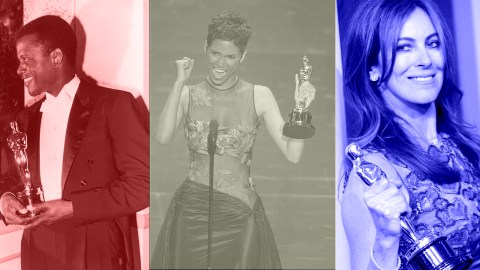What the Oscars say about the American story — and our values

PHOTO CREDIT: Charles Eshelman / Getty
The sequel no one asked for: The Academy of Motion Picture Arts and Sciences failed to recognize black filmmakers… again. The resulting outrage led to the Twitter hashtag #OscarSoWhite and host Chris Rock calling the ceremony the “white BET awards.” The reasoning behind the lack of diversity has led to many questions: Why is the Academy made up of 94 percent white people? Why are most of them older and male? Why is it so hard for black, Latino, Asian, and female filmmakers to get a film made, much less be nominated for an Oscar?
These are questions worth asking, investigating, and answering. It’s indicative of a larger problem, which is that Hollywood itself isn’t just a boys club, but a gated community for older, white rich men. Like a gated community, it takes care of its own and keeps out the, um, riff-raff. I don’t think that the Academy members are knowingly, intentionally racist or sexist. They most likely are capable of having grandiose discussions about the current race problems in America, and how “those people” who are blatantly racist are really just ignorant. All the while, they are failing to recognize their own power to influence opinion.
Sidney Poitier was the first black man to win an Oscar, and used his films to combat racism by refusing to play stereotypes. When he won Best Actor in 1964, Anne Bancroft kissed him on the cheek and caused a bit of a stir. This was the middle of the Civil Rights movement, only a year before MLK marched from Montgomery, Alabama, to Selma. His Oscar was a statement. It was a show of values. Films tell a story; they tell our story, the American story; they reflect our culture and values back to us. And when we ignore part of the American story by not honoring it with the same reverence as the parts that reflect our direct experience, whether it’s Straight Outta Compton or last year’s Selma (which got a paltry two nominations), we are saying their stories and their experiences matter less.
The Academy could argue they are just honoring the best talent, and this year none of the actors happened to be non-white. They could argue it’s not their job to make statements about race. But here’s the thing: No matter what you do, it will be seen as a statement. While the voters might not be racist, they are still woefully ignorant. They are unaware of their influence, their power, and the impact they have. Art can change minds and changed minds can change the world. That’s an awesome opportunity and a difficult responsibility. But you can do it, Hollywood. Using film to make a point is an idea as old as Cecil B. DeMille, and we know how much you love recycling ideas. Or maybe this whole issue could be summed up by paraphrasing a famous movie quote: Forget it, Jake; it’s Hollywood.





